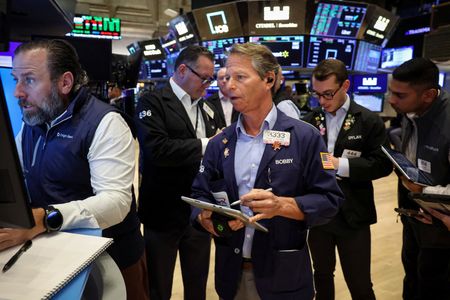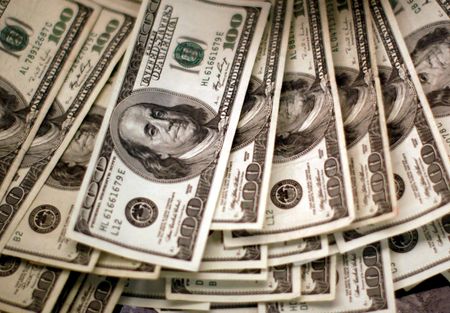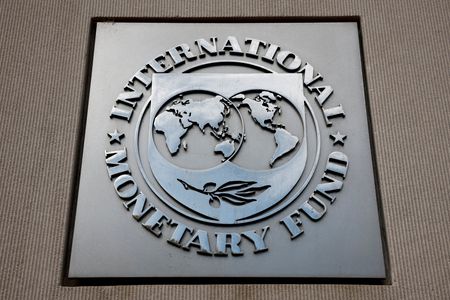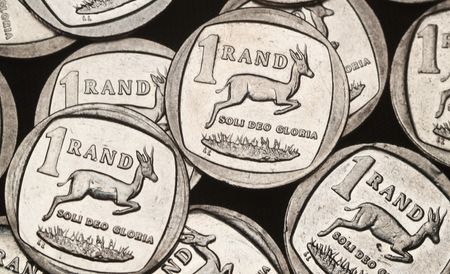By Chuck Mikolajczak
NEW YORK (Reuters) -Global stocks rallied on Monday to a fresh intraday record while the dollar eased on optimism that a potential trade deal was on the horizon between China and the U.S., as investors awaited a slew of central bank policy announcements and earnings from several megacap companies.
Top Chinese and U.S. economic officials on Sunday hammered out the framework of a trade deal for U.S. President Donald Trump and Chinese counterpart Xi Jinping to decide on at a meeting in South Korea scheduled for Thursday.
Trump said he thought a deal would be reached with China and announced a flurry of deals on trade and critical minerals in Malaysia with four Southeast Asian nations during the first stop of a five-day Asia trip.
A trade deal would halt heavier U.S. tariffs and Chinese rare earths export controls, helping allay some worries among investors that an agreement between the world’s two largest economies could be in jeopardy.
On Wall Street, U.S. stocks showed strong gains, with each of the three major indexes hitting fresh intraday records, led in part by gains in technology stocks, including a surge of more than 12% in Qualcomm shares after it unveiled two artificial intelligence chips for data centers, with commercial availability from next year.
“Markets just want to be positive. Investors want a reason to buy and they see that reason in whether it’s lower rates, trade deals, decent earnings or the continued dominance of the AI trade,” said Melissa Brown, managing director of investment decision research at SimCorp.
Earnings are expected this week from “Magnificent Seven” heavyweights Microsoft, Alphabet, Apple, Amazon and Meta Platforms, and investors will closely eye the results to see if they justify heightened valuations.
The Dow Jones Industrial Average rose 225.66 points, or 0.48%, to 47,432.96, the S&P 500 rose 69.92 points, or 1.03%, to 6,861.53 and the Nasdaq Composite rose 402.25 points, or 1.73%, to 23,607.11.
MSCI’s gauge of stocks across the globe climbed 9.9 points, or 0.99%, to 1,011.26 and was on pace for its third straight session of gains, while the pan-European STOXX 600 closed up 0.22% to a fresh record.
Argentina’s Merval index shot up 445,602.10 points, or 21.46%, to 2,522,460.68 while its bonds and currency also surged after President Javier Milei’s party won an overwhelming victory in a Sunday midterm election, a key requisite to keep economic reforms on track and a U.S. financial backstop in place.
The U.S. dollar weakened against the euro, Chinese yuan and Australian dollar on Monday as optimism over a possible U.S.-China trade deal boosted risk appetite and reduced demand for the greenback.
The dollar index, which measures the greenback against a basket of currencies including the yen and the euro, shed 0.03% to 98.89, with the euro up 0.09% at $1.1636.
The Chinese yuan 0.26% against the greenback to 7.109 per dollar.
The yuan was also boosted by the People’s Bank of China setting the official yuan midpoint rate higher than expected. Prior to the market open, it set the official yuan midpoint rate at 7.0881 per dollar, the strongest since October 15, 2024, and above a Reuters estimate of 7.1146.
Against the Japanese yen, the dollar strengthened 0.11% to153.02 while sterling was up 0.15% to $1.3328 against the greenback.
Investors will also grapple with major central bank meetings this week including Japan, Canada, Europe and the United States.
The Federal Reserve is widely anticipated to cut interest rates by 25 basis points after data showed U.S. consumer prices increased slightly less than expected in September, but the government shutdown and its impact on data remain a concern. Market expectations for a rate cut of 25 basis points stand at 97.8%, according to CME’s FedWatch Tool.
The European Central Bank and the Bank of Japan are both broadly expected to hold rates steady later this week.
The BOJ is likely to debate whether conditions are right to resume rate hikes as worries about a tariff-induced recession ease, but political complications may keep it on hold for now.
Japan’s new finance minister, Satsuki Katayama, said her meeting with U.S. Treasury Secretary Scott Bessent did not directly touch upon the Bank of Japan’s monetary policy.
In Treasuries, the yield on benchmark U.S. 10-year notes edged up 0.4 basis point to 4.001%, from 3.997% late on Friday.
(Reporting by Chuck Mikolajczak; additional Pranav Kashyap and Twesha Dikshit in Bengaluru, Amanda Cooper in London, Ankur Banerjee in Singapore; Editing by Mark Potter, Bernadette Baum and Nick Zieminski)










